 UptimeObserver
VS
UptimeObserver
VS
 Uptimewolf
Uptimewolf
UptimeObserver
UptimeObserver delivers robust online service monitoring, allowing users to proactively track website uptime, DNS changes, port availability, domain expiry, and SSL certificate status. Its all-in-one dashboard helps businesses and IT administrators detect issues instantly, with configurable notification intervals and responsive support.
Integrations with communication platforms like Slack, Telegram, Discord, and Pushover enable immediate alerts, ensuring teams are always informed and able to respond quickly. With a choice of flexible plans—including a free tier, fast monitoring intervals, and multiple status pages—UptimeObserver supports scalable solutions to safeguard your digital presence efficiently.
Uptimewolf
Uptimewolf is a versatile monitoring platform designed to keep websites, servers, and domain names consistently available. It delivers real-time uptime tracking, status page publishing, incident reporting, and server resource monitoring, enabling swift identification and resolution of outages or performance issues. With a user-friendly interface, it simplifies configuration and management of various monitors and integrates with popular notification channels for immediate alerts.
This solution further empowers users by monitoring heartbeats for cron jobs, tracking SSL certificates, overseeing DNS changes, and providing insightful analytics on status pages. Features such as password protection, customizable appearance, and white labeling enhance transparency and brand alignment, while extensive web utility tools support technical troubleshooting and diagnostics.
Pricing
UptimeObserver Pricing
UptimeObserver offers Freemium pricing with plans starting from $6 per month .
Uptimewolf Pricing
Uptimewolf offers Paid pricing with plans starting from $3 per month .
Features
UptimeObserver
- Website Monitoring: Proactive uptime checks at customizable intervals
- DNS Monitoring: Alerts for DNS record modifications
- Port Monitoring: Continuous monitoring of critical server ports
- SSL Certificate Monitoring: Advanced alerts before certificate expiry
- Domain Name Monitoring: Early reminders for impending domain expiration
- Multi-Platform Integrations: Real-time alerts via Slack, Telegram, Discord, Pushover, Webhooks, and Email
- Customizable Status Pages: Share incident and uptime statistics with stakeholders
- Multiple Monitoring Intervals: Granular settings from 30 seconds up to 5 minutes
- Free and Paid Plans: Flexible choices for different business needs
- Basic and Priority Support: Email and chat-based assistance
Uptimewolf
- Website Uptime Monitoring: Automated checks to track website, server, and port availability
- Heartbeat Monitoring: Ensures cron jobs and scheduled tasks are running as expected
- Domain & SSL Monitoring: Tracks domain expiration and SSL certificate validity
- DNS Monitoring: Detects and notifies about DNS record changes
- Server Resource Tracking: Monitors server CPU, RAM, and disk usage with custom alerts
- Customizable Status Pages: Public status pages with advanced analytics and visitor tracking
- Incident Notifications: Instant alerts with custom triggers via multiple channels
- Web Utility Tools: Includes DNS, IP, SSL, and HTTP tools for diagnostics
- Multi-location Checks: Verifies uptime from different global regions
- API Access: Enables advanced and automated integration for developers
Use Cases
UptimeObserver Use Cases
- Ensuring e-commerce website uptime and customer trust
- Receiving instant alerts for server outages or SSL issues
- Managing IT infrastructure with proactive monitoring and advance notifications
- Monitoring DNS and domain record changes for security
- Maintaining compliance by avoiding SSL or domain expiries
- Providing transparency with status pages for clients and users
Uptimewolf Use Cases
- Monitor online store uptime and notify IT teams of outages
- Provide transparent service status updates to customers with branded status pages
- Track server performance metrics and receive alerts for resource overuse
- Detect domain or SSL certificate expiration to avoid security lapses
- Supervise DNS changes for improved security and stability
- Ensure critical background jobs and scheduled processes run reliably
- Analyze visitor statistics and incidents on service status pages
- Troubleshoot website issues using advanced web diagnostic tools
FAQs
UptimeObserver FAQs
-
How often does UptimeObserver check my site?
Monitoring intervals can be customized from every 30 seconds to less frequent intervals, depending on the selected plan. -
What types of alerts does UptimeObserver provide?
Alerts can be sent via email, Telegram, Slack, Discord, Pushover, and other available integrations to ensure prompt notifications. -
What happens if my website goes down?
You receive an alert through your chosen communication method, including details about the downtime or issue detected. -
Does UptimeObserver check from multiple locations?
Multiple location monitoring is currently available to a limited group of customers, with plans to expand availability soon.
Uptimewolf FAQs
-
What is Uptimewolf?
Uptimewolf is a monitoring service that ensures your websites, servers, and domains remain accessible, with features like status pages and heartbeat monitoring for comprehensive oversight. -
What is a status page and why is it important?
A status page is a publicly visible page displaying real-time service availability, helping inform customers during outages and reducing support teams' workloads by building trust and transparency. -
How does server and domain monitoring with Uptimewolf function?
Uptimewolf performs regular checks on servers and domains, sending instant alerts if it detects issues like downtime or expired SSL certificates, allowing for quick resolution. -
What is heartbeat monitoring?
Heartbeat monitoring tracks the regular execution of scheduled tasks or APIs, alerting you if a process fails to report back within a given timeframe.
Uptime Monitor
Uptime Monitor
Average Uptime
99.86%
Average Response Time
827.24 ms
Last 30 Days
Uptime Monitor
Average Uptime
99.71%
Average Response Time
372.48 ms
Last 30 Days
UptimeObserver
Uptimewolf
More Comparisons:
-
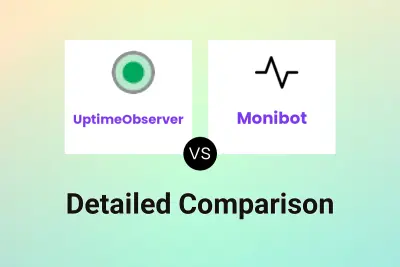
UptimeObserver vs Monibot Detailed comparison features, price
ComparisonView details → -
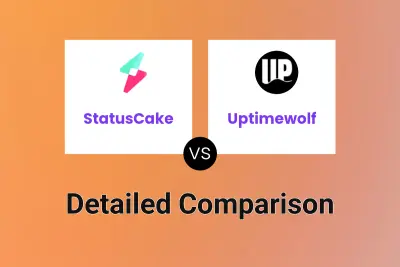
StatusCake vs Uptimewolf Detailed comparison features, price
ComparisonView details → -

Uptime.com vs Uptimewolf Detailed comparison features, price
ComparisonView details → -

Monibot vs Uptimewolf Detailed comparison features, price
ComparisonView details → -
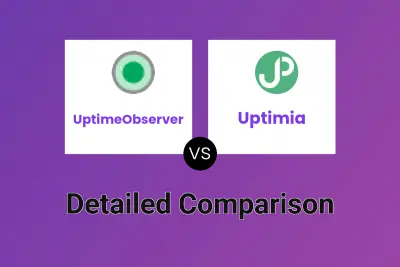
UptimeObserver vs Uptimia Detailed comparison features, price
ComparisonView details → -

UptimeObserver vs 66uptime Detailed comparison features, price
ComparisonView details → -
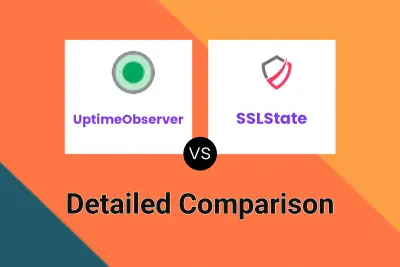
UptimeObserver vs SSLState Detailed comparison features, price
ComparisonView details → -
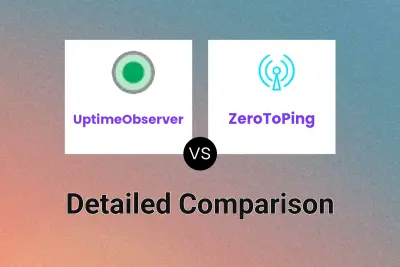
UptimeObserver vs ZeroToPing Detailed comparison features, price
ComparisonView details →
Didn't find tool you were looking for?